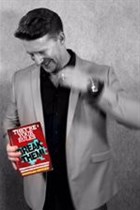
On stage, Jobs was casual without being unfocused. He was real without being unprofessional. He was warm without deviating from the point. Jobs was a master at connecting with the minds and imaginations of his audiences.
One of his best known presentations was the 'Stay Hungry, Stay Foolish' address at Stanford University in 2005. If you've never seen it, take fourteen-and-a-half minutes out of your day and watch:
In this presentation, Jobs uses a number of his signature techniques to engage and persuade his audience. Consider his opening:
"I am honored to be with you today at your commencement from one of the finest universities in the world. I never graduated from college. Truth be told, this is the closest I've ever gotten to a college graduation. Today I want to tell you three stories from my life. That's it. No big deal. Just three stories. The first story is about connecting the dots..."
The pleasantries
Jobs addresses the pleasantries and formalities, at a prestigious university-level event, in a single line. Have you ever noticed how long it takes the average untrained speaker to meander through a series of "Honoured This's" and "Revered That's"?
The worst of them are now dabbling with a new and even ghastlier trick, which is to say, "All protocol observed." What in 10 levels of horrific meaninglessness is that?!
Jobs says, "I'm honoured to be here," and moves on. That will do nicely.
The Hook
His next device is to hook interest with a controversial statement: "Truth be told, this is the closest I've ever gotten to a college graduation."
That's quite an attention-getter, given the circumstances. Jobs knows that his goal is not to waffle out a long opening, but to capture and pique their curiosity. And he does it very early on. Sentence number two, in fact.
When designing the opening of your presentation, your goal is not to spend five minutes putting out sweet oratory fluff. Your goal is to capture their attention. A controversial statement can work wonders.
The mental journey
In his third sentence, Jobs begins to lay the framework of expectations.
Too many speakers are five minutes or more into their presentations before we even realise where they are going with them; what the point of the talk will be. In a few quick lines, Jobs provides us with a clear route-map outlining the mental journey to follow: "Today I want to tell you three stories from my life. That's it. No big deal. Just three stories."
The channel
Stories are Jobs' primary channel as a speaker. They are the means he uses to make his points. Stories, it has often been said, are the medium of human communication. There is nothing more powerful than a story for making a point come alive. The first thing I teach to aspiring speakers is to use stories in their presentations; even the dry, technical talks.
Jobs' stories are compelling, but they are also just the stuff of his life.
Telling your own stories will ensure that your content is always unique. After all, no one else has lived your life, had your experiences, or learned your lessons.
The anchor line
Jobs starts his first story with an 'anchor line,' which is: "The first story is about connecting the dots." By telling us this, we already have a sense of the point of the story to come. We have a frame of reference.
Anchor lines can be used at any point in a story, but for greatest clarity, you should repeat them throughout the telling, so that your audience is very clear on what you are driving at. Without an anchor line, the point in your story may not be clear.
The concluding power-line
Jobs knew that the last thing you say rings in the audience's minds after you leave. And that's why he used this emotive conclusion, in the form of a direct exhortation: "...I have always wished that for myself. And now, as you graduate to begin anew, I wish that for you. Stay Hungry. Stay Foolish."
I would encourage you to watch this speech. Take note of how easy and how natural it looks. Then consider the amount of underlying technique I have pointed out here, and this is by no means all of the strategy that informed his presentation.
The lesson? An easy, natural-looking speech relies on your knowledge of technique. Jobs' 'Stay Hungry, Stay Foolish' speech looks like a warm conversation. And it took a lot of technique to make it so.
And so, we truly have lost a great technical talent. Sadly, it was attached to some formidable oratory skill, too. Perhaps the folks commenting on social media have stumbled upon the best way of looking at it: We haven't lost Steve Jobs. Heaven just received a major upgrade!
For more:
